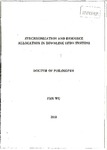SYNCHRONIZATION AND RESOURCE ALLOCATION IN DOWNLINK OFDM SYSTEMS
| dc.contributor.supervisor | Abu-Rgheff, Mosa Ali | |
| dc.contributor.author | Wu, Fan | |
| dc.contributor.other | School of Engineering, Computing and Mathematics | en_US |
| dc.date.accessioned | 2010-11-15T13:15:33Z | |
| dc.date.available | 2010-11-15T13:15:33Z | |
| dc.date.issued | 2010 | |
| dc.identifier | 10026729 | en_US |
| dc.identifier.uri | http://hdl.handle.net/10026.1/295 | |
| dc.description.abstract |
The next generation (4G) wireless systems are expected to provide universal personal and multimedia communications with seamless connection and very high rate transmissions and without regard to the users’ mobility and location. OFDM technique is recognized as one of the leading candidates to provide the wireless signalling for 4G systems. The major challenges in downlink multiuser OFDM based 4G systems include the wireless channel, the synchronization and radio resource management. Thus algorithms are required to achieve accurate timing and frequency offset estimation and the efficient utilization of radio resources such as subcarrier, bit and power allocation. The objectives of the thesis are of two fields. Firstly, we presented the frequency offset estimation algorithms for OFDM systems. Building our work upon the classic single user OFDM architecture, we proposed two FFT-based frequency offset estimation algorithms with low computational complexity. The computer simulation results and comparisons show that the proposed algorithms provide smaller error variance than previous well-known algorithm. Secondly, we presented the resource allocation algorithms for OFDM systems. Building our work upon the downlink multiuser OFDM architecture, we aimed to minimize the total transmit power by exploiting the system diversity through the management of subcarrier allocation, adaptive modulation and power allocation. Particularly, we focused on the dynamic resource allocation algorithms for multiuser OFDM system and multiuser MIMO-OFDM system. For the multiuser OFDM system, we proposed a lowiv complexity channel gain difference based subcarrier allocation algorithm. For the multiuser MIMO-OFDM system, we proposed a unit-power based subcarrier allocation algorithm. These proposed algorithms are all combined with the optimal bit allocation algorithm to achieve the minimal total transmit power. The numerical results and comparisons with various conventional nonadaptive and adaptive algorithmic approaches are provided to show that the proposed resource allocation algorithms improve the system efficiencies and performance given that the Quality of Service (QoS) for each user is guaranteed. The simulation work of this project is based on hand written codes in the platform of the MATLAB R2007b. | en_US |
| dc.language.iso | en | en_US |
| dc.publisher | University of Plymouth | en_US |
| dc.subject | OFDM MIMO Sychronization Resource allocation | en_US |
| dc.title | SYNCHRONIZATION AND RESOURCE ALLOCATION IN DOWNLINK OFDM SYSTEMS | en_US |
| dc.type | Thesis | |
| dc.identifier.doi | http://dx.doi.org/10.24382/3650 |
Files in this item
This item appears in the following Collection(s)
-
01 Research Theses Main Collection
Research Theses Main


